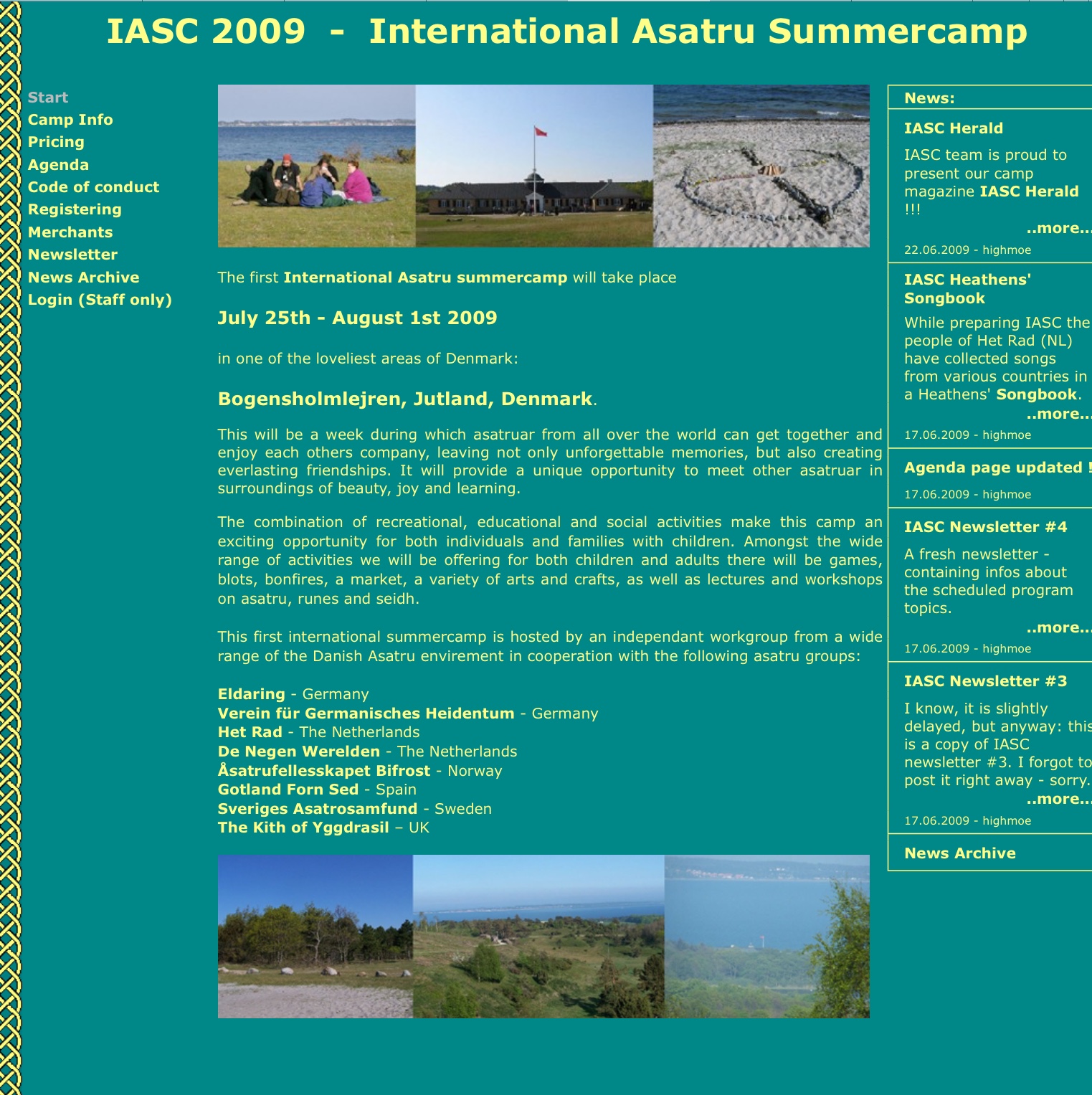The history of IASC
The first International Asatru Summer Camp is an old dream that has been talked about in several different contexts, by several different people. The idea was presented in Vølse, the Forn Siðr members’ magazine, in September 2006 by Martin P. Hansen, but there had previously been a lot of discussion about such an idea among various ásatrú both in Denmark and abroad. Approximately two weeks after the September Vølse was published, Martin presented the idea on the yahoo group Ásatrú-EU – a list where several European ásatrú organizations communicate with each other.
It turned out that Haimo Grebenstein from VfGH on the allthing of Eldaring had been talking about how VfGH had organized summer camps and had invited Eldaring to the latest one. Het Rad in Holland, have for several years held midsummer weekends, where they have invited guests from abroad, just as Aarhus Blótlaug in Jutland every Easter since 2000 have held open house for other ásatrú, with guests from both Denmark and abroad.
The attitude was generally very positive towards the project .At Forn Siðrs Alting 2007 a proposal was therefore submitted that the Board of Forn Siðr should take on the task to create such a camp. Everyone thought the camp was a good idea, but nobody wanted to impose this task on the board. The proposal was withdrawn, and the board asked for help from people who were not board members, to create such a camp. Martin took up this invitation, and the talks continued on the EU list, and in physical meetings between asatruars from different countries. The project progressed. It was agreed that the first camp should be located in Denmark because it is geographically well situated in relation to the other northern European countries, a country where it is easy to book a suitable hut, and the country where Forn Siðr, the organization, is having the best financial situation, and has its home.
A Danish workgroup of volunteers from both, outside and inside Forn Siðr, was created. Following the wishes of the Forn Siðr Althing none from the board of Forn Siðr was in the group.
Out of a range of different alternatives Bogensholm at Mols, eastern Jutland were selected. It was a suitable size and, from a north European perspective, it was easy to reach. The first real preparations for the camp were made and Haimo Grebenstein set up an international website, with all the information about the camp.
Everything was progressing according to the plan when suddenly, in November 2008, a subject turned up where opinion went in several different directions. To make a complicated story short, it ended with Forn Siðr, on the 8th December, withdrawing from co-operation with the camp. Martin P. Hansen continued as co-ordinator for the project, since the other groups still wanted him to do this. Several asatruar in Denmark contacted the Danish work-group with support statements for the summer camp and a desire to ensure its continued existence. A week and a half later, the Danish workgroup had increased from five to ten persons. This group had quickly to find an internal cooperation policy and a sensible way of sharing the labour. The Workgroup didn’t, as the other involved groups, have an already established co-operation, or common ground on faith, statutes and years of knowledge of each other. The Danish group only had its enthusiasm for summer camps and the fact that we all, in our own way, put our faith in the Nordic gods. From time to time the question of racism comes up. It is a fact that some racist oriented groups also favour the old Norse faith. All of the organising groups have a clear statement in their bylaws that clearly states they do not favour this approach to our faith. The Danish Workgroup has no bylaws, and no statement around the faith itself. We decided to keep it that way, leaving everyone in the group free to have their own opinion. On the topic of racism, however, we definitely do agree and to make it absolutely clear where we stand, we made the following statement around this:“The Danish workgroup for IASC 2009 will not in any respect or on any level be associated with either groups or persons who equate between religion and race – blood – genes – ethnicity or in any way embraces one of these factors as a prerequisite for one of the others, or in any other way speak for, or support such attitudes.”
Apart from that we simply follow the code of conduct created for the camp. This code makes it so very easy to cooperate.
The Bogensholm camp is booked in the name of the Danish workgroup and all entries from Denmark are carried out through the Danish workgroup on their website. As from January 2009 the work around the summer camp is running smoothly again and we expect an overwhelming success in the last week of July – when we finally all meet in real life, in one of the most beautiful areas in Frejas hall (as Denmark is called in the Danish national hymn).We think it’s a great strength for the summer camp that the people working with the camp in the hosting country are from this very wide range of different groups in the ásatrú environment in the country. It creates a very broad and strong foundation for the camp to lean on. This is indeed a joint venture. And has been since today.
